15 Ways to Boost Your Child’s Confidence and 8 Fun Activities
When it comes to boosting your child's confidence, you might be surprised at how simple strategies can make a significant impact. Encouraging positive self-talk, setting achievable goals, and celebrating even the smallest successes can lay a strong foundation for their self-esteem. Additionally, engaging in fun activities like team sports or creative arts can further develop their social skills and resilience. However, the journey to building confidence isn't just about the actions you take—it's also about the environment you create. So, what are some specific steps you can start taking today?
Encourage Positive Self-Talk
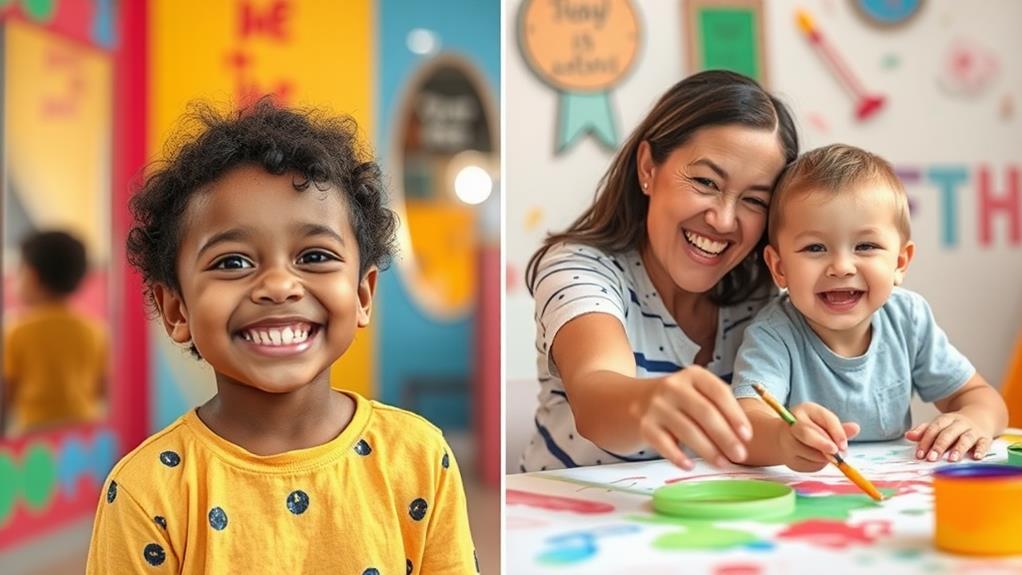
Encouraging positive self-talk is essential for boosting your child's confidence. When you help your child develop a habit of speaking kindly to themselves, you're laying the groundwork for a resilient mindset.
Start by modeling this behavior; use positive phrases when discussing challenges or setbacks. For instance, instead of saying, "I can't do this," try, "I'll give it my best shot." Your child is likely to notice and imitate your attitude.
Next, create opportunities for your child to practice positive self-talk. Encourage them to repeat affirmations like, "I am capable," or "I am worthy of success." You might also write these affirmations on sticky notes and place them where they can easily see them each day. This visibility reinforces the message.
Additionally, when your child faces difficulties, guide them to reframe negative thoughts. If they feel frustrated, ask them to think about what they've learned instead of focusing solely on the struggle. This shift in perspective nurtures a growth mindset.
Set Achievable Goals
Breaking larger tasks into smaller steps makes challenges feel less overwhelming. It's essential to ensure these goals aren't just realistic but also time-bound. A deadline can instill a sense of urgency and commitment.
Encourage your child to track their progress, whether through a checklist or a journal. This visual representation can boost their motivation and keep them focused.
As they achieve these smaller goals, they'll gain a sense of accomplishment that builds their self-esteem. By consistently setting and reaching achievable goals, your child will develop resilience and a positive mindset, preparing them for future challenges and successes.
Celebrate Small Successes

Amid the journey of growth, celebrating small successes is crucial in boosting your child's confidence. Every little achievement, whether mastering a new skill or completing a homework assignment, deserves recognition. When you acknowledge these moments, you help your child build a positive self-image and reinforce their belief in their abilities.
Start by creating a routine where you celebrate these victories. It could be as simple as giving a high-five or verbal praise. Maybe you can keep a success journal together, where you jot down accomplishments, big or small. This not only provides a visual reminder of their growth but also serves as a motivational tool during challenging times.
Involving family or friends can amplify the celebration. Host a small gathering to share your child's recent achievements, or create a fun awards ceremony at home. By making these moments special, you encourage your child to strive for more successes.
Foster Independence
Fostering independence in your child can significantly boost their confidence and self-reliance. When you encourage them to take on tasks by themselves, you're helping them develop essential life skills. Start with small responsibilities, like letting them pack their own lunch or choose their outfit for the day. This gives them a sense of ownership and control over their choices.
As they grow, gradually introduce more complex tasks. For example, involve them in meal planning or allow them to organize their homework schedule. This not only teaches them important skills but also shows them that you trust their judgment. Trust is a powerful motivator!
It's also essential to create a safe space where they can make mistakes and learn from them. Instead of jumping in to fix things, guide them with encouragement. For instance, if they struggle with a project, ask questions that lead them to find solutions rather than providing the answers immediately.
Lastly, celebrate their efforts and achievements, no matter how small. Acknowledging their independence reinforces their belief in themselves, paving the way for greater confidence in tackling future challenges.
Promote Problem-Solving Skills
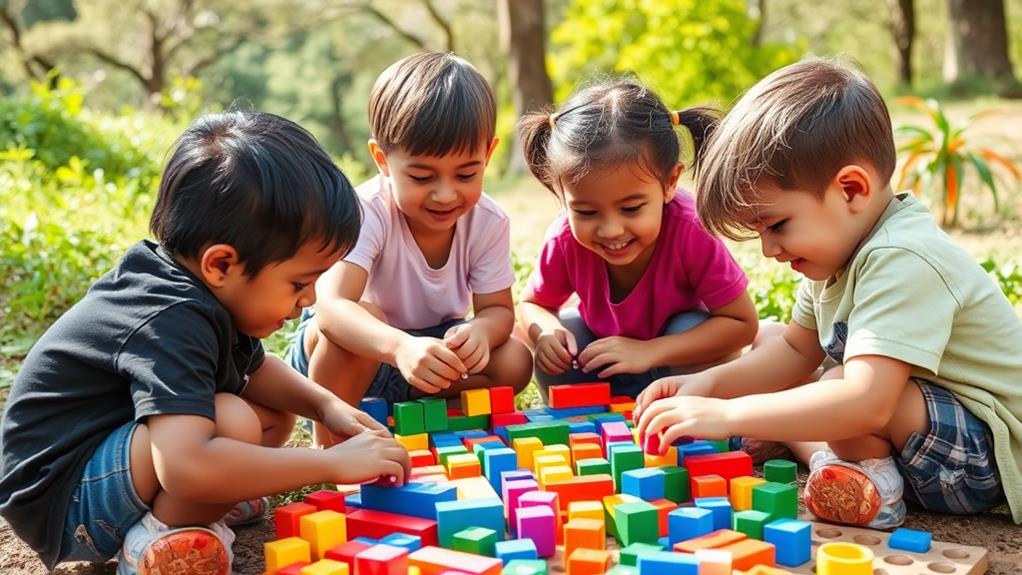
One effective way to boost your child's confidence is by promoting problem-solving skills. When children face challenges and learn to navigate them, they gain a sense of accomplishment that builds their self-esteem.
Start by presenting them with age-appropriate problems, whether it's a tricky puzzle, a math question, or a real-life situation like planning a small event. Encourage them to brainstorm solutions, and don't rush in to provide answers right away.
Instead, ask guiding questions that help them think critically. For example, if they're trying to decide how to organize their room, you might ask, "What would happen if you put your books on the shelf instead of the floor?" This encourages them to explore options and evaluate their choices.
Celebrate their efforts, no matter the outcome. Praise their thought process and creativity, reinforcing the idea that making mistakes is part of learning.
You can even make it a fun game! By practicing problem-solving in a supportive environment, you're equipping your child with essential skills that will serve them well in school and life, all while boosting their confidence along the way.
Provide Constructive Feedback
Consistently providing constructive feedback is crucial for building your child's confidence. When you give feedback, focus on specific behaviors rather than personal traits. Instead of saying, "You're not good at math," try, "I noticed you struggled with that problem. Let's work on some strategies together." This approach helps your child understand that improvement is possible and encourages a growth mindset.
It's also important to balance your feedback. Highlight what your child did well before discussing areas for improvement. This not only boosts their confidence but also makes them more receptive to your suggestions. For instance, you might say, "I loved how you expressed your ideas in that project! To make it even better, consider adding more details about your research."
Encourage your child to ask questions about their performance. This promotes open communication and shows that you value their thoughts. Remember to be patient; growth takes time, and your supportive feedback will help them navigate challenges.
Create a Supportive Environment
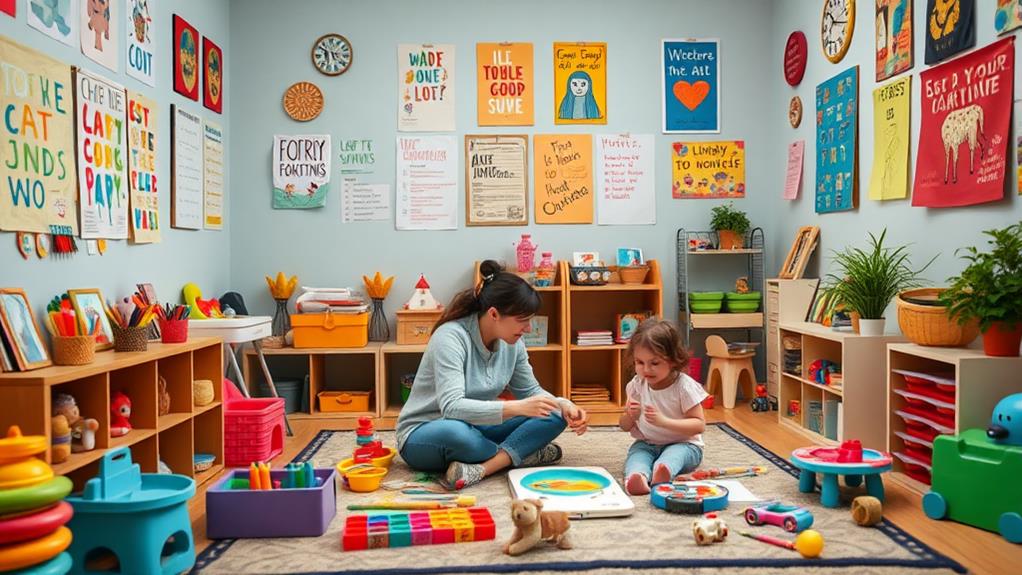
Creating a supportive environment is key to boosting your child's confidence. When your child feels secure and valued, they're more likely to take risks and try new things.
Start by establishing open communication. Encourage them to share their thoughts and feelings without fear of judgment. This builds trust and helps them feel understood.
Next, celebrate their achievements, no matter how small. A simple "I'm proud of you" can go a long way. Make sure to show appreciation for their efforts, emphasizing the importance of trying rather than just succeeding. This helps them realize that mistakes are part of the learning process.
Additionally, create a positive atmosphere at home. Surround your child with uplifting messages, whether through books, posters, or discussions.
Model a growth mindset by demonstrating resilience in your own challenges. When they see you facing obstacles, they'll learn that it's okay to stumble and get back up.
Encourage Creative Expression
Encouraging creative expression can significantly enhance your child's confidence. When kids engage in activities like drawing, painting, or writing, they tap into their imagination and discover their unique voice. This process helps them develop a sense of autonomy, which is crucial for building self-esteem.
You can start by providing your child with various materials—crayons, paints, or even a journal. Let them experiment without the pressure of perfection. Encourage them to express their feelings or ideas through art, music, or storytelling. Celebrate their creations, no matter how small, and show genuine interest in what they produce. This affirmation can go a long way in boosting their confidence.
Consider joining your child in these activities. Whether it's crafting together or sharing stories, your involvement can make them feel supported and valued.
You could also explore community art classes or workshops, where they can meet peers and share their creativity. These experiences not only foster skills but also offer a sense of belonging.
Model Confidence

Building your child's confidence also involves modeling it yourself. Kids are like sponges; they absorb everything they see and hear. When they watch you tackle challenges with determination and a positive attitude, they're more likely to mirror that behavior.
Show them how to face setbacks by discussing your own experiences. Let them see you bounce back from mistakes, turning failures into learning opportunities.
Your body language speaks volumes too. Stand tall, make eye contact, and speak with conviction. These non-verbal cues can instill a sense of security and confidence in your child.
When you embrace challenges with a can-do attitude, you're teaching them that it's okay to take risks and step out of their comfort zone.
Encourage open discussions about feelings and anxieties. When you share your own doubts, you demonstrate that everyone experiences them, but it's how we respond that counts.
Celebrate your achievements, no matter how small, and invite your child to join in the celebration. This creates an environment where confidence flourishes.
Engage in Physical Activities
Engaging in physical activities can significantly boost your child's confidence. When kids participate in sports, dance, or even simple outdoor games, they learn to push their limits and achieve goals. This hands-on experience helps them realize their capabilities and strengthens their self-belief.
You might consider joining them in activities like biking, swimming, or hiking. Not only does this give your child a chance to bond with you, but it also shows them that fun and fitness can go hand in hand.
Encourage them to try different sports or physical activities, whether it's joining a local team or participating in community events. As they develop new skills, they'll likely feel a sense of accomplishment. Celebrate their victories, no matter how small, and remind them that effort is what truly counts.
Moreover, engaging in physical activities can improve their overall well-being. It reduces stress and anxiety, allowing kids to focus better in school and feel happier in general.
Teach Social Skills
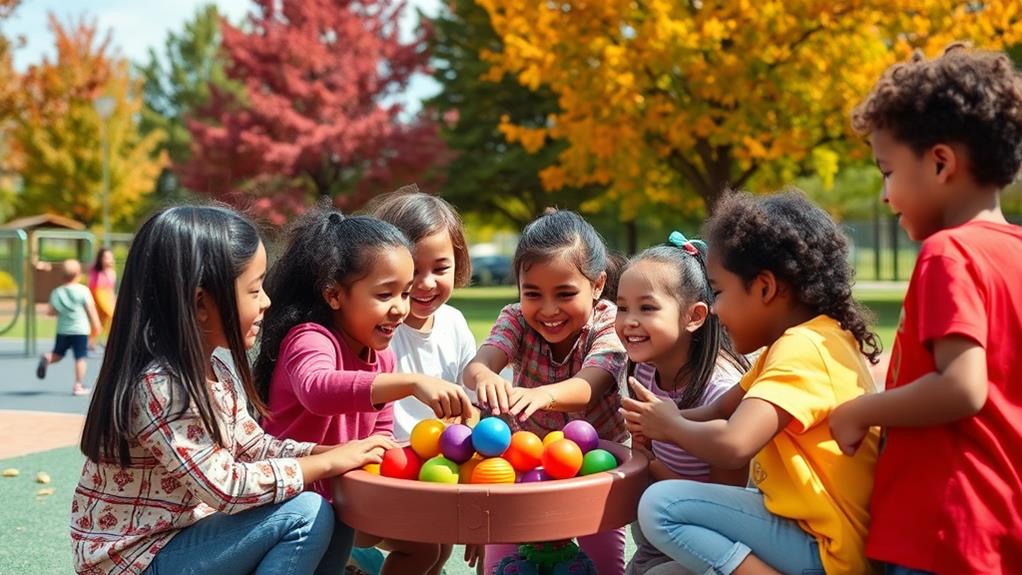
Teaching your child essential social skills can have a profound impact on their confidence and ability to interact with others. Start by encouraging them to practice eye contact, as it shows engagement and interest.
Role-playing different social scenarios can be a fun way to help them navigate conversations and understand social cues. For instance, you might act out a situation where they introduce themselves or ask someone to play.
Additionally, teach them the importance of listening actively. Encourage your child to ask questions and show genuine interest in what others say. This not only builds relationships but also makes them feel valued in conversations.
Another crucial skill is empathy. Help your child recognize and understand others' feelings, which can enhance their social interactions. You could discuss characters in books or movies and ask how they might feel in various situations.
Lastly, celebrate their small victories in social settings. Whether they initiate a conversation or make a new friend, acknowledging these moments will build their confidence.
Limit Comparisons With Peers
While developing social skills is important, it's equally vital to help your child understand the value of their unique qualities. Kids often compare themselves to their peers, which can lead to feelings of inadequacy. You can help your child by encouraging them to appreciate their strengths. Remind them that everyone has different talents, and that's what makes each person special.
Instead of focusing on who's better at sports or academics, highlight your child's individual achievements, no matter how small. Celebrate their progress in areas they enjoy, whether it's painting, coding, or even their kindness to others. By shifting the focus away from comparisons, you're helping them build a solid foundation of self-worth.
Limit discussions about other kids' accomplishments, and instead create an environment where your child feels safe to express themselves without judgment. Encourage them to set personal goals rather than competing with friends.
When they see their unique qualities as valuable, they'll develop a stronger sense of confidence. Remember, it's all about helping them realize that they don't need to be like everyone else to be amazing!
Involve Them in Decision-Making

Involving your child in decision-making can significantly boost their confidence and sense of responsibility. When you let them participate in choices, whether it's picking out dinner or deciding on weekend activities, they feel valued and heard. This not only teaches them critical thinking but also helps them understand the impact of their choices.
Start with small decisions, like choosing their outfit for the day or selecting a book for bedtime reading. As they become more comfortable, you can gradually introduce bigger decisions, such as planning a family trip or choosing a new hobby. Make sure to explain the reasons behind certain options, encouraging them to weigh pros and cons.
You might also ask for their opinion on household matters, like organizing a family game night. This shows them that their ideas truly matter.
Remember, it's essential to respect their choices, even if they surprise you. When kids see that their input leads to real outcomes, it boosts their self-esteem and motivates them to take on new challenges.
Allow for Mistakes
Embracing mistakes as a natural part of learning is crucial for building your child's confidence. When your child makes a mistake, it's important to create a safe space where they feel comfortable exploring their feelings. Instead of focusing on the error itself, guide them to see it as a stepping stone toward growth.
Encourage them to ask questions about what went wrong and brainstorm ways to improve next time. This approach not only helps them learn but also reinforces the idea that mistakes are okay.
You might also want to share your own experiences with mistakes. Let them know that everyone, including you, makes errors, and that's part of being human. This can help normalize the experience and show them that learning is a journey.
Additionally, celebrate their efforts, even if the outcome isn't perfect. Acknowledging the effort encourages resilience and perseverance.
When your child knows it's okay to fail, they're more likely to take risks and try new things, which ultimately boosts their confidence. Remember, it's not about perfection; it's about growth, learning, and building a strong foundation for their future.
Show Unconditional Love

Showing unconditional love is essential for nurturing your child's confidence. When you express love without conditions, your child feels secure and valued, no matter their achievements or mistakes. This foundation helps them take risks and explore new things without the fear of disappointing you.
Make it a habit to verbalize your love regularly. Simple phrases like "I love you just the way you are" or "I'm proud of you, no matter what" can make a world of difference. These affirmations create a safe space for your child to express themselves and develop their individuality.
Additionally, be present during both their successes and setbacks. Celebrate their achievements, whether big or small, and offer support during tough times. When your child knows you're there for them, they'll build resilience and self-esteem.
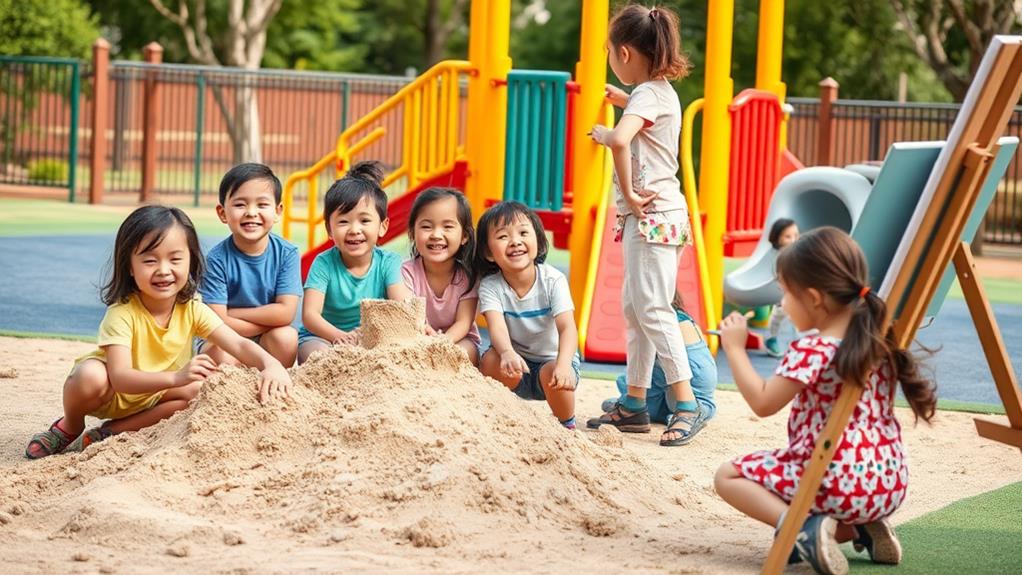
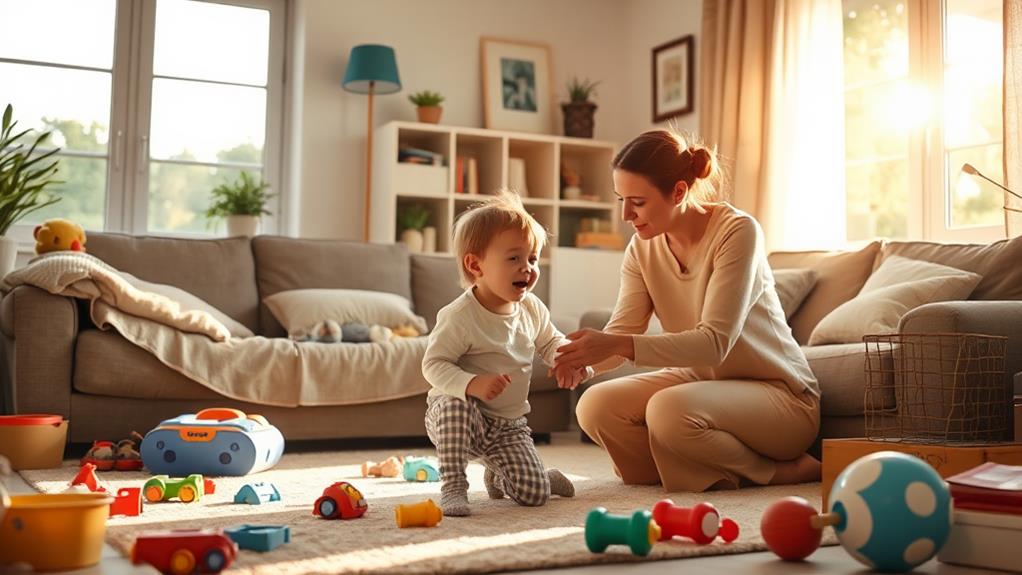
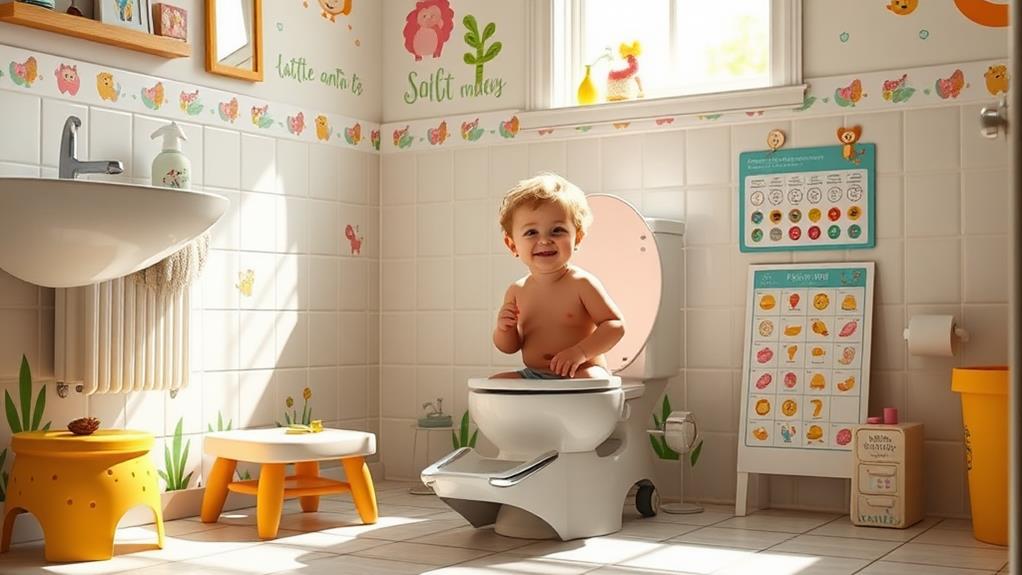











Post Comment